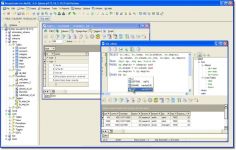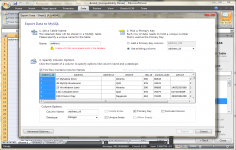 MySQL 5.1.48
MySQL 5.1.48
MySQL AB - (Open Source)
MySQL is a successful open source database used in most web applications, e-commerce and online transaction processing.
MySQL is one of the world's most famous and used open source database. The software can be used to manage web applications, e-commerce and online transaction processing since MySQL database incorporates support those transactions. It is also commonly associated with PHP when it comes to managing websites.
With standard JDBC , ODBC, and Net, the developer can choose the programming language. MySQL has the advantage of working with almost all the popular operating systems and communicate easily with programming languages ​​such as C, C + +, VB, C #, PHP, Python, Ruby, Java, Perl, Eiffel, etc.MySQL replication allows you to create profitable applications. In addition, it enables the development of typologies replication complex and massive chain.Its reliability and robustness, performance, ease of use makes MySQL have more success than anticipated.
- Title:
- MySQL 5.1.48
- File Size:
- 38.9 MB
- Requirements:
- Windows 9x / 2000 / XP / Vista / Windows7 / Windows8
- Language:
- en-us
- License:
- Open Source
- Date Added:
- 16 Jun 2010
- Publisher:
- MySQL AB
- Homepage:
- http://www.mysql.com
- MD5 Checksum:
- 103FB5527AA00BE528589CAF8FC41BDE
# Bugs fixed:
* Important Change: Replication: MyISAM transactions replicated to a transactional slave left the slave in an unstable condition. This was due to the fact that, when replicating from a nontransactional storage engine to a transactional engine with autocommit turned off, no BEGIN and COMMIT statements were written to the binary log; thus, on the slave, a never-ending transaction was started. The fix for this issue includes enforcing autocommit mode on the slave by replicating all autocommit=1 statements from the master. (Bug#29288)
* Partitioning: ALTER TABLE statements that cause table partitions to be renamed or dropped (such as ALTER TABLE ... ADD PARTITION, ALTER TABLE ... DROP PARTITION, and ALTER TABLE ... REORGANIZE PARTITION) — when run concurrently with queries against the INFORMATION_SCHEMA.PARTITIONS table — could fail, cause the affected partitioned tables to become unusable, or both. This was due to the fact that the INFORMATION_SCHEMA database ignored the name lock imposed by the ALTER TABLE statement on the partitions affected. In particular, this led to problems with InnoDB tables, because InnoDB would accept the rename operation, but put it in a background queue, so that subsequent rename operations failed when InnoDB was unable to find the correct partition. Now, INFORMATION_SCHEMA honors name locks imposed by ongoing ALTER TABLE statements that cause partitions to be renamed or dropped. (Bug#50561) See also Bug#47343, Bug#45808.
* Partitioning: It was possible to execute a CREATE TEMPORARY TABLE tmp LIKE pt statement, where pt is a partitioned table, even though partitioned temporary tables are not permitted, which caused the server to crash. Now a check is performed to prevent such statements from being executed. (Bug#49477)
* Partitioning: When attempting to perform DDL on a partitioned table and the table's .par file could not be found, the server returned the inaccurate error message Out of memory; restart server and try again (needed 2 bytes). Now in such cases, the server returns the error Failed to initialize partitions from .par file. (Bug#49161)
* Replication: In some cases, attempting to update a column with a value of an incompatible type resulted in a mismatch between master and slave because the column value was set to its implicit default value on the master (as expected), but the same column on the slave was set to NULL. (Bug#52868)
* Replication: When using a non-transactional table on the master with autocommit disabled, no COMMIT was recorded in the binary log following a statement affecting this table. If the slave's copy of the table used a transactional storage engine, the result on the slave was as though a transaction had been started, but never completed. (Bug#49522) See also Bug#29288.
* Replication: Reading from a table that used a self-logging storage engine and updating a table that used a transactional engine (such as InnoDB) generated changes that were written to the binary log using statement format which could make slaves diverge. However, when using mixed logging format, such changes should be written to the binary log using row format. (This issue did not occur when reading from tables using a self-logging engine and updating MyISAM tables, as this was already handled by checking for combinations of non-transactional and transactional engines.) Now such statements are classified as unsafe, and in mixed mode, cause a switch to row-based logging. (Bug#49019)
* Valgrind warnings resulting from passing incomplete DATETIME values to the TIMESTAMP() function were corrected. (Bug#53942)
* Builds of the embedded mysqld would fail due to a missing element of the struct NET. (Bug#53908)
* UPDATE on an InnoDB table modifying the same index that was used to satisfy the WHERE condition could trigger a debug assertion under some circumstances. (Bug#53830)
* For single-table DELETE statements that used quick select and index scan simultaneously caused a server crash or assertion failure. (Bug#53450)
* Incorrect results could be returned for LEFT JOIN of InnoDB tables with an impossible WHERE condition. (Bug#53334)
* Fixed a checksum error reported for compressed tables when the --innodb_checksums option is enabled. (Bug#53248)
* Corrected the handling of the setting innodb_change_buffering=default. (The appropriate default value is different between MySQL 5.1 and 5.5.) (Bug#53165)
* mysqldump and SELECT ... INTO OUTFILE truncated long BLOB and TEXT values to 766 bytes. (Bug#53088)
* DBUG code could in some cirsumstances call FreeState() twice, leading to a server crash or failure. (Bug#52884)
* Aggregate functions could incorrectly return NULL in outer join queries. (Bug#52051)
* The Loose Index Scan optimization method assumed that it could on the storage engine to maintain interval endpoint information, which was not true for the partitioning engine. (Bug#50939)
* Calculation of intervals for Event Scheduler events was not portable. (Bug#50087)
* Selecting from INFORMATION_SCHEMA.ROUTINES or INFORMATION_SCHEMA.PARAMETERS resulted in a memory leak. (Bug#48729)
* When the transaction isolation level was REPEATABLE READ and binary logging used statement or mixed format, SELECT statements with subqueries referencing InnoDB tables unnecessarily acquired shared locks on rows in these tables. (Bug#46947)
* Using an initial command with mysql_options(..., MYSQL_INIT_COMMAND, ...) that generated multiple result sets (such as a stored procedure or a multi-statement command) left the connection unusable. (Bug#42373)
* If a crash occurs while creating an index using the InnoDB “Fast Index Creation†mechanism, the partially created index is dropped during the crash recovery processing when the database is restarted.
Related software
2.1/5 from 178 users


